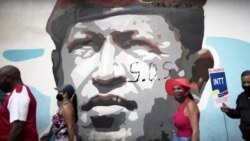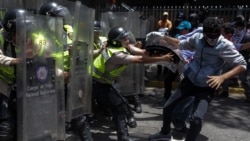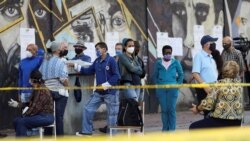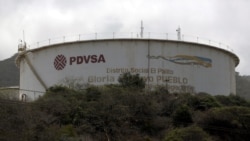On February 22, the European Union imposed sanctions on 19 Venezuelan officials, lawmakers and members of the security forces in response to parliamentary elections the EU saw as rigged to favor Nicolas Maduro.
The sanctioned individuals were targeted for "their role in acts and decisions undermining democracy and the rule of law in the country, or as a result of serious human rights violations." The EU sanctions include travel bans and asset freezes.
Venezuela's foreign minister, Jorge Arreaza, responded on Twitter.
"To use false arguments against honorable citizens in reaction to the frustration of a group of member states of the European Union for the manifest ineffectiveness of their actions to force a change of government by force in Venezuela, is nothing more than another reckless decision, with the sole intention of negatively affecting the political dialogue taking place in the country," Arreaza wrote.
He also said the sanctions were illegal and “a sort of arrogant affront to the United Nations” after the U.N. special rapporteur urged that unilateral sanctions against Venezuela be lifted given their effects on the country.
The debate over sanctions is complex, but it’s misleading for Arreaza to claim that the sanctions are based on “false arguments.”
The EU Council stated that it imposed sanctions because Venezuela’s legislative elections were "a missed opportunity for democracy, were held without a national agreement on electoral conditions, and failed to comply with the international standards for a democratic process." It also said that Venezuela’s lack of respect for human rights meant that its “citizens feared arrest and persecution, including of their families, for exercising their fundamental rights and freedoms.”
All 19 sanctioned individuals were accused of involvement in such abuses.
Human rights
Take Remigio Ceballos, one of the individuals sanctioned. He has been the operational commander of Venezuela’s armed forces (CEOFANB) since 2017. CEOFANB controls the Bolivarian National Armed Forces and National Guard. As the EU stated, “various sources, including the Independent International Fact-Finding Mission on the Bolivarian Republic of Venezuela, attribute human rights violations to FANB and the Bolivarian National Guard.”
As Polygraph.info reported in September, a United Nations-backed fact-finding mission stated that Maduro and other high-ranking Venezuelan officials were involved in systemic human rights abuses against government opponents between 2014 and 2018.
The U.N. report stated that two security forces – the Scientific, Penal and Criminal Investigation Corps (CICP) and the Special Action Forces (FAES) of the National Bolivarian Police (PNB) – were responsible for 59 percent of all the killings by Venezuelan security forces that were reviewed. The report said the FAES should be dismantled and its chain of command held accountable. The EU also sanctioned the current director of FAES, Jose Miguel Dominguez Ramirez.
Along with protesters, Maduro’s regime has persecuted opposition politicians and activists. Hundreds of people have been arrested or exiled (although Maduro said in a briefing last September 1 that he was pardoning 110 of them).
During protests in 2017 that followed the Venezuelan Supreme Court’s ruling dissolving the parliament, Human Rights Watch and the Penal Forum (Foro Penal), a Venezuelan human rights organization, issued a joint report which found that at least 314 people were victims of human rights violations by Venezuelan security forces and armed pro-government groups (known as colectivos). The report concluded that “the abuses have been part of a systematic practice by the Venezuelan security forces.” That conclusion was consistent with the findings of an August 2017 report by the Office of the United Nations High Commissioner for Human Rights.
Political crisis
The EU imposed sanctions on several members of Venezuela’s Supreme Court for undermining “democracy and the rule of law in Venezuela” through “actions, statements and rulings that have usurped the constitutional powers of the National Assembly and undermined the opposition’s electoral rights.”
Last year, Venezuela's Supreme Court appointed a new elections commission without members of the opposition-led Congress, despite it being legally required. The court also removed the leaders of three opposition parties and appointed leaders accused by the opposition of conspiring to support the president.
In July 2020, the Office of the United Nations High Commissioner for Human Rights said that "the recent decisions of the Supreme Court of Justice diminish the possibility of building conditions for credible and democratic electoral processes."
Venezuela’s main opposition coalition boycotted last December’s parliamentary elections, whose results were rejected by the U.S. and the European Union, among others. The results gave Maduro – who already had the support of the military, courts and prosecutors – control of the parliament.
The EU also sanctioned individuals involved in changing the norms for parliamentary elections, some of whom were part of the National Electoral Council (CNE) and prepared and supervised the December elections. They included Indira Alfonzo, who was tapped as elections council chief in June 2020.
The debate over sanctions
On February 12, United Nations Special Rapporteur Alena Douhan released a preliminary report recommending that unilateral sanctions against Venezuela be lifted and that the government be granted access to funds frozen in the U.S., U.K. and Portugal. Douhan argued that those sanctions exacerbated the country’s economic and humanitarian crises.
Arreaza based his response to the newly imposed EU sanctions on Douhan’s recommendations.
The U.S. first imposed sanctions on Venezuela, "related to antidemocratic actions, human rights violations, and corruption," during the administration of President Barack Obama, when the South American nation was already experiencing an economic crisis. The Trump administration toughened the sanctions on Venezuela and gradually shifted from individual to sectoral sanctions, intensifying the economic pressure. (Sectoral sanctions prohibit transactions with companies believed to be engaging in illicit actions on behalf of a government, rather than simply blocking the assets or movements of individual government officials.)
The 2019 sanctions against Venezuela's oil sector, particularly the state-owned Petroleos de Venezuela, S.A. (PDVSA), kept international crude oil buyers away from the country, whose economy mainly relies on oil exports. The sanctions also affected gasoline production, preventing PDVSA from importing chemicals used to refine its heavy crude. According to experts, the sanctions, paired with mismanagement and underfunding, threaten a diesel and gasoline shortage in the country.
In January 2019, the nongovernmental organization Washington Office on Latin America (WOLA) criticized the U.S. government's sanction on PDVSA.
"We are deeply concerned at the potential for the recently announced U.S. sanctions to intensify the severe hardships and suffering that millions of Venezuelans are enduring … Venezuela’s oil exports represent the main source of hard currency used to pay for imports. Without this revenue, it is clear that the importation of food and medicine could be put at risk," WOLA said.
Later in 2019, Michelle Bachelet, the U.N.'s High Commissioner for Human Rights, decried the Trump administration's order freezing all Venezuelan government assets in the U.S. and barring transactions with authorities. She said the measures were "extremely broad” and lacked “sufficient measures to mitigate their impact on the most vulnerable sectors of the population," the Guardian reported.
Alejandra Arredondo, from Voice of America's Spanish service, contributed to this report.









